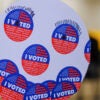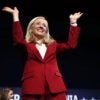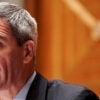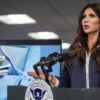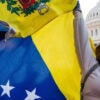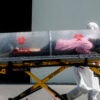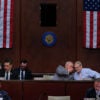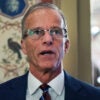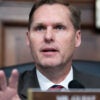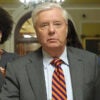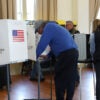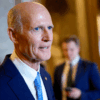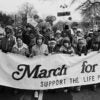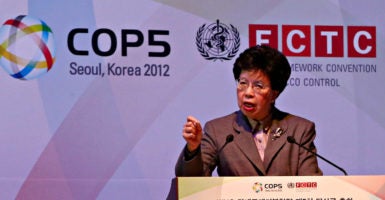Taxpayer advocacy groups around the globe are calling on the World Health Organization to open this week’s anti-tobacco convention in New Delhi, India, to the news media.
Since the proceedings could not take place without taxpayer funding, journalists should not be prohibited from covering public policy deliberations that could have significant ramifications for taxpayers, the advocates argue in a letter to WHO’s director-general and delegates of the World Health Assembly.
Instead, the World Health Organization should “operate in a more fiscally responsible, more transparent manner and strive to become a leader in promoting press freedom,” the coalition of taxpayer advocacy groups say in the letter, a copy of which was obtained by The Daily Signal.
WHO was founded in 1945 as an arm of the United Nations to help alleviate sickness and promote health across the globe.
The fact that the U.N. hosts World Press Freedom Day while banning journalists from the events of an affiliated organization is “hypocritical and despicable,” one American reporter told The Daily Signal.
In 2003, WHO used its authority under the U.N. to create a treaty called the Framework Convention on Tobacco Control to “protect present and future generations from the devastating health, social, environmental, and economic consequences of tobacco consumption and exposure to tobacco smoke.”
The treaty, among other things, calls for a global excise tax on tobacco products of at least 70 percent.
Every two years, delegates from countries participating in the Framework Convention on Tobacco Control gather for what is called the Conference of the Parties. This week’s conference, running Monday through Saturday, will be the seventh such conference.
On the subject of press freedom, the letter from the taxpayer advocacy groups to Dr. Margaret Chan of China, WHO’s director-general, says:
The WHO has been openly hostile to journalists and the values of press freedom. In 2012, during the WHO’s Framework Convention on Tobacco Control in South Korea, delegates banned public spectators, then later expelled the media from much of the event. In 2014, the media and public were again thrown out of the WHO’s tobacco control convention in Moscow. Members of the media reported that they were forcibly removed from the meeting.
In recent months, the WHO held two meetings [in] Turkmenistan, a country that regularly jails journalists and was ranked as the third-worst country in the world for respecting press freedom by Reporters Without Borders.
Signatories to the letter include taxpayer groups from the U.S., Australia, Canada, Italy, South Korea, Serbia, Hong Kong, New Zealand, Peru, the United Kingdom, Germany, Belgium, Ghana, Ukraine, and Zambia.
They are not alone in criticizing what they view as a lack of openness and transparency on the part of WHO officials.
In September, Gary Johns, a former Australian government minister, released a report—timed to the closing date for those seeking to become the World Health Organization’s next director-general—that described the anti-tobacco convention as “a closed shop which uses exclusion to silence debate.”
Now that a campaign is underway to elect a new director-general to succeed Chan in 2017, critics see an opportunity to push for reforms throughout the organization. Next July 1, member states will vote.
Even here, the international coalition of taxpayer advocates sees a potential problem, addressed in their letter:
For the first time in the history of the WHO, the next [director-general] will be decided by secret ballot. Since WHO officials have been accused of accepting bribes, voting by secret ballot will only increase fears of voting impropriety.
Drew Johnson, a reporter with The Daily Caller who is in New Delhi to cover the Conference of the Parties, said in an email exchange with The Daily Signal that “it’s already been made clear to journalists that we should expect to be banned from most of the proceedings.”
“I have no doubt that by the end of the first day of the six-day meeting, media will be kicked out,” Johnson wrote.
This is the third time Johnson has covered the biannual conference. He was in attendance four years ago in Seoul, when delegates representing member countries voted to ban the media from most of the event.
The vote was held, he said, “so they could vote in secret, with no accountability.”
Two years ago, at the conference in Moscow, “there wasn’t even a vote,” Johnson recalled:
U.N. officials chose to kick journalists out of the event. When I attempted to sit in a section that was intended for the media, I was yanked out of my chair and pulled out of the room. They canceled press briefings, wouldn’t allow interviews, and told us not to come back until a press conference during the final day of the meeting.
Johnson noted that the U.N. hosts World Press Freedom Day, when it “tells countries to open their meetings to journalists and treat journalists with respect.” Banning journalists from U.N.-related events is “hypocritical and despicable,” he added.
WHO’s unwillingness to invite in the news media and other stakeholders such as tobacco industry representatives and law enforcement officials ultimately works to its disadvantage, Roger Bate, an economist and visiting scholar with the American Enterprise Institute, told The Daily Signal.
Bate is the author of a new report that takes a critical look at the Framework Convention on Tobacco Control’s Protocol to Eliminate Illicit Trade in Tobacco Products, established in 2012.
The protocol against illicit tobacco trade cannot enter into force until 40 countries ratify it. So far, 20 countries have done so.
Since WHO lacks expertise in trade policy and in combating organized crime, which could take advantage of free trade zones, the protocol’s prospects for success remain limited in the absence of outside help, Bate said.
For starters, he recommends that the Framework Convention on Tobacco Control invite Interpol, the intergovernmental police agency based in France, to attend its meetings and offer policy recommendations.
But because Interpol previously partnered with tobacco giant Philip Morris International and accepted funding from it as part of an effort to combat illegal trafficking, WHO officials have resisted Interpol’s input and participation, Bate said.
“Interpol knows more about illegal trade than any other organization,” he said. “When you are trying to work out solutions for dealing with illegal markets, you need the people who have this law enforcement expertise and you need the industry people who make the legal product.”
Bate acknowledged what he called an “understandable distrust of industry” that is linked to the history of tobacco executives who denied the addictive traits of nicotine and harmful effects of smoking. Even so, he warned, WHO’s “ideological hatred of industry could lead to counterproductive policies.”
The hostility to journalists, most of whom are determined to do their job and ask tough but fair questions, is equally debilitating, the American Enterprise Institute scholar said:
This all goes back to the thin-skinned nature of the World Health Organization. They have this attitude that you are either with them or against them. They don’t want balanced reporting; they want propaganda.
The Daily Signal sought comment from appropriate WHO media representatives, asking them to comment on the organization’s treatment of the press and use of taxpayer funds. They did not respond before publication deadline.
While the U.S. is the top financier of WHO, spending about $400 million annually, it is not a party to the Framework Convention on Tobacco Control.
What this means in practice is that the U.S. can apply pressure for reform, Bate said, “but not in a very aggressive way.”
Even so, pressure is coming from other directions.
The Taxpayers Protection Alliance, a Washington-based nonprofit, released a report in October that is critical of WHO and the Framework Convention on Tobacco Control in particular. The group’s report raises questions not just about press freedom and the use of taxpayer funds, it also questions the premise of the tobacco framework’s policy orientation.
“Economists and political commenters alike shared concerns that an international tobacco tax benchmark ratified by the [Framework Convention on Tobacco Control] in 2014 amounted to an attack on national sovereignty,” the report says. “The FCTC’s global 70 percent minimum excise tax on tobacco products constitutes the largest tax increase in the history of the world, as well as the first global tax.”
David Williams, president of the Taxpayers Protection Alliance, would like to see U.S. lawmakers start to ask some hard questions about how a U.N. body funded with U.S. taxpayer dollars is using these funds.
“There needs to be more light focused on the World Health Organization by the U.S. Congress,” Williams said, adding:
But we’ve had nothing from our own Congress on this lack of transparency and the massive waste of U.S. taxpayer dollars. This is a taxpayer-funded body, which is why taxpayers all around the world should be concerned about them holding what look to be secretive meetings where they throw out stakeholders who won’t be allowed to express their opinions.
The Taxpayers Protection Alliance is the lead signatory of the coalition letter of complaint to WHO.
“Ultimately,” Johnson told The Daily Signal in an email, the conference meeting this week “is a legislative body voting on issues that impact billions of people.”
“Citizens have a right to know what is going on at the meeting,” the reporter said. “People deserve to know what’s discussed, what decisions are being made, and how representatives from different countries vote on the issues.”

